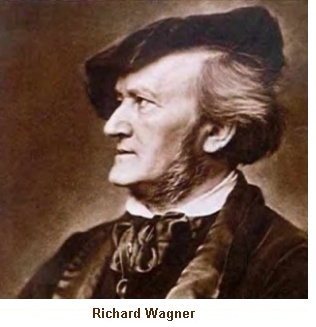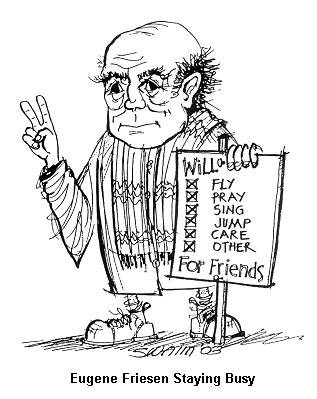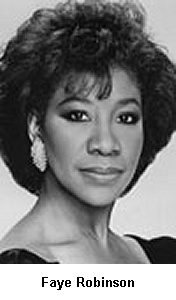
The Voice of Orpheus
Volume 5, #1____October 2003
Art: Bob Swaim ____ Editor: Ned Mackey

Lucky Thirteen
Tucson’s premier male choir, Sons of Orpheus, begins its thirteenth season. Led by founder/director Grayson Hirst, sixty men will perform two dozen concerts locally and then head for Italy next summer. We’ll bring you our standard range of music from classic to classy and hope for big audiences to make it a lucky thirteenth for the whole community.Early Program Notes, From Opera...
Our faithful followers know we like to start off fortissimo to concentrate the audience’s attention. We began last year’s Spring Concerts with French horns and two hunting songs from operas by Karl Maria von Weber. Richard Wagner admired Weber for his passion, his use of folk themes, and his efforts in the preceding generation to infuse opera with all the arts. This season we’ll get you going with the “Chorus of Norwegian Sailors” from Act III of Wagner’s 1843 Der Fliegende Holländer (The Flying Dutchman).

The legend of the Flying Dutchman is said to have begun in 1641 when a captain van der Decken, looking out at the crags of the Cape of Good Hope and daydreaming about what a fine thing it would be for the Dutch East India Company to build a nice hotel there, failed to notice he was heading into a terrible storm. By the time the lookout managed to break into the captain’s reverie, it was too late. Despite the sailors’ valiant efforts, the ship hit the rocks and sank with all hands. With his last breath van der Decken cursed his fate and vowed to round the cape even if he had to battle that horrific turmoil forever. So, he and his crew sail on in their ghost ship to this day. Should you be obliged to dare that passage, feign seasickness and hide under your bunk, for if you see the specter, you are doomed. Just climb the mainmast and get it over with.
Wagner added a love element to the story. His Dutch captain gets shore leave every seven years, during which time, if he can find a woman who will be true to him even to her death, he has the opportunity to end his long voyage. On one such vacation he does, and she is, and Wagner’s passionate and lyrical Der Fliegende Holländer lives on in a way the legend never anticipated.
According to Wagner, a sea chanty provided the impetus for the chorus we’ll sing for you. He wrote, “A feeling of indescribable well-being came over me as the granite walls of the cliff echoed the chantings of the crew as they cast anchor and furled the sails. The sharp rhythm of their call stuck with me as an omen of good fortune and soon resolved itself into the theme of the sailors’ chorus in my Der fliegende Holländer.” Men’s choirs can do that. We’ll serve it up for you with plenty of salt.
And A Movie
Not long ago Grayson took his teenage son Dalton to see the Mel Gibson film, We Were Soldiers. At the conclusion Dalton bolted for the food court to restore himself for the inch or two he had grown during the movie. But Grayson, stunned by the “power and gory” of the final scene, waited to catch his breath. As he sat in the darkness, a sublime sound came up behind the credits. It was the West Point men’s glee club singing “The Mansions of the Lord,” composed by Nick Glennie-Smith with a text by Randall Wallace. Grayson knew it would be perfect for Orpheus. We’ll sing it for the first time at a ceremony celebrating the seventy-fifth anniversary of Tucson’s VA Hospital on Veterans Day. Wallace’s text reads as follows:To fallen soldiers let us sing
where no rockets fly or bullets wing.
Our broken brothers let us bring
to the mansions of the Lord.No more bleeding, no more fight,
no prayers pleading through the night,
just divine embrace, eternal light
in the mansions of the Lord.Where no mothers cry and no children weep,
we will stand and guard though angels sleep,
all through the ages safely keep
the mansions of the Lord.Rachmaninoff’s “Vocalise”
Last season we performed a piece that was spoken. Lots of words. All spoken. Not a single singer sang it. It was Ernst Toch’s “Geographical Fugue.” We enjoyed doing it, although there was some grumbling early in the learning process about how fiendishly difficult it was with the four sinewy parts winding in and out, stopping and starting oddly, and no melodic line to hitch your wagon to.This season we’ll sing a piece with only one word. Not a word really, the syllable “ah,” and melody enough to get us back to even. Many famous orchestras have recorded this beautiful music; solo voices and instrumentalists as well. We are looking forward to showing you how Orpheus does it.
Good News Inside...
First tenor Bob Swaim will have a special reason to make a joyful noise this year: In May he and his wife Donna, a humanities professor and Faculty Fellow at the U of A, flew to Jacksonville, Florida to be near Mayo Clinic surgeons who were planning to toss her faulty liver to the alligators and install a new one. A liver, that is. The Swaims were prepared to wait several months for the transplant, but on a visit to the Okefenokee Swamp just a few days after Donna got on the waiting list, her beeper beeped. Several hours later Donna had a new lease on life. Six weeks after that she was back in Tucson looking wonderful and reading for classes this fall.And Way Out
Baritone Eric Christensen spotted a comet nobody had seen before. When that happens, the comet bears the discoverer’s name forever as it meanders through the solar system. Eric works for the Lunar and Planetary Laboratory at the U of A where one of his jobs is to keep track of things that might run into us while our backs are turned. Let us hope we never see Eric’s comet (officially C/2003 K2 Christensen) in newspaper headlines.Missing Man Formation
On July 3 Grayson got a frantic call from the Tucson Sidewinders. “We gotta have you guys. Randy Johnson is going to throw a few innings to complete his rehab from knee surgery. We’ll sell 12,000 tickets. You can do three patriotic songs and the ‘Star-spangled Banner’ before the ball game, and how about ‘God Bless America’ during the seventh inning stretch? Oh, and be sure to time your opening songs to the exact second, because we’re having a jet fighter fly-over from Davis Monthan just as you hit ‘and the home of the brave.’”Grayson rounded up everyone who hadn’t managed to escape town: about half the choir. We found out at rehearsal the night before the gig that Randy had a felt a twinge while he was brushing his teeth or something that morning and wouldn’t be able to pitch.
Most of the 12,000 fans showed up anyway. Everybody had a fine time, although people were a little disappointed that the fly-over had been abandoned in favor of a half dozen swallows flitting around in search of supper. Randy couldn’t make it, but by golly, Orpheus was there. And a couple of the men sang with sprained vocal cords too!
Sports Page Continued
The University of Arizona invited us to perform our national anthem at the UA/TCU football game September 27th. We sing it straight, no frills or furbelows, a harmonious, sturdy, no-nonsense version from the Naval Academy that’s so good it makes you want to listen all the way through instead of starting to yell after “o’er the land of the free” as has become the custom at sporting events. Whenever we sing it we hear praise as we head to our seats (or out the door). “Yeah, that’s the way it ought to go!”We sang it at the Stanford game last basketball season. Stanford won, but we’ve been asked back for next season anyway. Lute doesn’t carry grudges.
A Reunion
The first performance in our tour of Germany, Austria, and Hungary in 2000 was with a choir from the Hürth-Barrenrath region near Cologne. Besides being good singers, they are a jolly group who know how to throw a good party, a gemütlikeit, when the singing is done. We shared the stage with them again on September 19 at the Holsclaw auditorium, then met them at Las Cazuelitas, a Mexican restaurant at 36th street and 6th avenue, where we had dinner and introduced them to Mexican beer and Mariachi Tapatio, the best mariachi band in town. We proved the solid construction of Las Cazuelitas. The walls withstood a night of mariachi music and German drinking songs with nary a crack. Tapatio is a band we’re making big plans with. More about that in the next issue.
(See Dinner Shows on the back page!) Profiling Eugene Friesen
Eugene was born in a small Mennonite community in Western Nebraska in 1929. Quaint as it may seem, his grandfather’s unwillingness to blacken the brass lanterns on his buggy ostracized the family— a sting Eugene remembers from an early age. He worked hard on the family farm, but daydreamed through school. The word “escape” best describes his leaving home just before his seventeenth birthday without money or paternal blessing. But leave he did for Owosso Bible College in Michigan. He got by on a dollar a day, making his living driving a ninety-mile paper route.During his final year there he married his beloved Leta, and he won a place on the Varsity Quartet, about which he tells this story: “I had a suit but no overcoat, so the first time I went out to sing, I wore a mackinaw. Turned out this wasn’t acceptable. After that I wore only my suit and told everybody Nebraska winters had made me so tough I didn’t need an overcoat.”
After completing school at Owosso, Eugene and Leta headed for Upland, Indiana and Taylor University where the first of their three children was born. Eugene put in another year to finish his B.A. in Psychology.

For the next year Eugene worked a factory job. Here the work ethic that had served him so well got him into trouble. His boss regularly sent him off to hide until others down the line could catch up with Eugene’s output. Following the factory job Eugene served as minister of a church in South Carolina, during which time he decided, despite his pacifistic background, to become an army chaplain. Upon reporting to his first post, the guard at the gate surprised him with a salute. Eugene’s salute, his very first, knocked his cap into the back seat.
The Korean war was just winding down, so Eugene was sent to Munich where the broadening of his horizons pleased him so much he decided to raise them too. He joined the paratroopers. “I was terrified of heights,” he says, “but everything I’ve done in my life has scared me to death.” As a chaplain at Fort Bragg, he made 65 jumps in two years.
At the end of Eugene’s army career (though he stayed in the Reserves for thirty years and retired a full colonel), he and an old friend from Owosso decided to learn to fly so they could use a plane in missionary work. They bought a Piper Super Cub and island-hopped across the Caribbean to Suriname at just the time when the government in Paramaribo was showing some interest in the uncharted interior of the country. Eugene’s flying skill served him well; he crashed only twice in the two years of that adventure.
Out of the steamy South American jungle and into the drier one of academe, Eugene earned a Ph.D. in Counseling and Guidance at Michigan State University while ministering full time to a small Methodist congregation.
After that he became the head of the psychiatric ward at a VA hospital in Battle Creek where he began a philosophical shift away from the academic focus on pathology toward an emphasis on wellness. Later he became the director of the Community Health Center in Lansing, where he won a $2,000,000 grant to increase the staff from twenty counselors to seventy.
In 1974 Eugene moved to Tucson and went into private counseling practice, earning another Ph.D. along the way. In 1989 he returned to the ministry, first at St. Francis in the Foothills, then the Green Valley Community Church from which he retired in 2000. He has sung with Orpheus since 1993.
Eugene is well into an autobiography. One suspects it’ll be humorously told and fascinating. Can’t wait to read it.
Grants
Sons of Orpheus sustains itself by means of membership dues, the sale of CDs, admission charges for some concerts, donations from our supporters, an annual rummage sale, and competitive grants based on artistic value, service to the community, administrative ability, and other criteria. Successful grant applications require a good deal of time and skill. The man who jumps through those hoops for us is Vaughn Huff. We thank him, the National Endowment for the Arts, the Arizona Arts Council, and the Tucson/Pima Arts Council. Without the help of these granting agencies, we’d be stuck with several rummage sales.Orpheus Board Member Faye Robinson
A professor of vocal music at the U of A, Faye has highlighted her spectacular career in the great opera houses of Paris, Berlin, Vienna, and Argentina. She is equally renowned as a concert artist, having performed with orchestras in Chicago, Cleveland, New York, Boston, London, and Berlin. She has become known as a specialist in the interpretation of the works of Sir Michael Tippet. Faye has been with us from the beginning.

Dinner Shows and Holiday Fare
10/19 Dinner show at Las Cazuelitas restaurant, 2615 S. 6th Ave., with Mariachi Tapatio and Ballet Folklorico Tapatio. 5:30-8:30, $25 per plate. Call 621-1649 for information. Call 405-6035 for tickets. Visa and Master Card accepted.11/22 Brunch/Lunch shows at La Fuente, 1749 N. Oracle, with Mariachi Tapatio and Ballet Folklorico Tapatio. 12 to 2 and 2 to 4. $25 per plate. See above.
12/2 Lowes Ventana Canyon, 7000 N. Resort Dr. Tree lighting party, 5-7 p.m. Free to the public.
12/3 The Berger Auditorium at the Arizona School for the Deaf and Blind, 1200 W. Speedway. With ASDB Kids. 7:00 p.m. Admission: food items for the Tucson Community Food Bank: nonperishable foods: a can of soup, or a collection you have to drag in.
12/7 St. Francis De Sales, 1375 S. Camino Seco. 6:30 p.m. Free to the public.
12/9, 10, 11 San Xavier Mission, with the Tucson Boys’ Chorus for Patronato San Xavier. 6:00 and 8:00 p.m. Tickets are $75, ($60 tax deductible). Call Lorraine Drachman at 325-2488 or e-mail her at Ldrachman@cox.net for reservations.
12/14 Crowder Hall on the U. of A. campus, joint holiday concert with the Catalina Foothills Women’s Choir. 3:00 p.m. Tickets $10. $7 for students and seniors. Park in the Speedway/Park Ave. parking garage and exit to the east. Use the Speedway underpass and walk up to the school of music.
Programs of Sons of Orpheus are supported in part by grants from the
Tucson/Pima Arts Council and the Arizona Commission on the Arts.
Printed by International Minute Press, 5551 E. Grant Rd. Greg Michael owner.
Sons of Orpheus
The Male Choir of Tucson
P.O. Box 31552
Tucson, AZ 85751
To send us comments or questions about Sons of Orpheus,
please use your email program to contact us using this address.
![]()
![[Home]](home.gif)